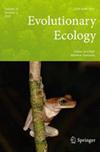巢穴转换与巢穴整合:对 Fernandez-Duque 等人的评论
IF 2.1
3区 环境科学与生态学
Q3 ECOLOGY
引用次数: 0
摘要
Fernandez-Duque 等人(Evol Ecol 37:859-869,2023 年)报告了在同种鸟类的巢中发现能够自由活动的雏鸟的情况,这些雏鸟还太小,不能飞行。有趣的是,养父母会喂养这些入侵的雏鸟。研究人员认为这是一种新的行为,并称之为 "巢穴融合"。然而,在鸟类学和行为学文献中,这种行为曾被记录为 "换巢"。通过将费尔南德斯-杜克等人的研究结果与有关 "换巢 "的文献进行整合,可以更好地理解他们所强调的 "换巢 "行为的演变过程,以及可能促进这种行为的条件。本文章由计算机程序翻译,如有差异,请以英文原文为准。
Nest switching vs. nest integration: a comment on Fernandez-Duque et al.
Fernandez-Duque et al. (Evol Ecol 37:859-869, 2023) reported instances where fledglings, able to move freely, were found in the nests of others of the same species containing chicks that were too young to fly. Interestingly, the foster parents fed these intruder fledglings. The researchers identified this as a novel behavior and termed it “Nest Integration.” However, this behavior had been documented previously as “nest switching” in both ornithological and behavioral literature. By integrating the findings of Fernandez-Duque et al. with the literature on nest switching, the evolution of nest switching highlighted by them, and the conditions that might promote it, could be better understood.
求助全文
通过发布文献求助,成功后即可免费获取论文全文。
去求助
来源期刊

Evolutionary Ecology
环境科学-进化生物学
CiteScore
3.00
自引率
5.30%
发文量
70
审稿时长
3 months
期刊介绍:
Evolutionary Ecology is a concept-oriented journal of biological research at the interface of ecology and evolution. We publish papers that therefore integrate both fields of research: research that seeks to explain the ecology of organisms in the context of evolution, or patterns of evolution as explained by ecological processes.
The journal publishes original research and discussion concerning the evolutionary ecology of organisms. These may include papers addressing evolutionary aspects of population ecology, organismal interactions and coevolution, behaviour, life histories, communication, morphology, host-parasite interactions and disease ecology, as well as ecological aspects of genetic processes. The objective is to promote the conceptual, theoretical and empirical development of ecology and evolutionary biology; the scope extends to any organism or system.
In additional to Original Research articles, we publish Review articles that survey recent developments in the field of evolutionary ecology; Ideas & Perspectives articles which present new points of view and novel hypotheses; and Comments on articles recently published in Evolutionary Ecology or elsewhere. We also welcome New Tests of Existing Ideas - testing well-established hypotheses but with broader data or more methodologically rigorous approaches; - and shorter Natural History Notes, which aim to present new observations of organismal biology in the wild that may provide inspiration for future research. As of 2018, we now also invite Methods papers, to present or review new theoretical, practical or analytical methods used in evolutionary ecology.
Students & Early Career Researchers: We particularly encourage, and offer incentives for, submission of Reviews, Ideas & Perspectives, and Methods papers by students and early-career researchers (defined as being within one year of award of a PhD degree) – see Students & Early Career Researchers
 求助内容:
求助内容: 应助结果提醒方式:
应助结果提醒方式:


